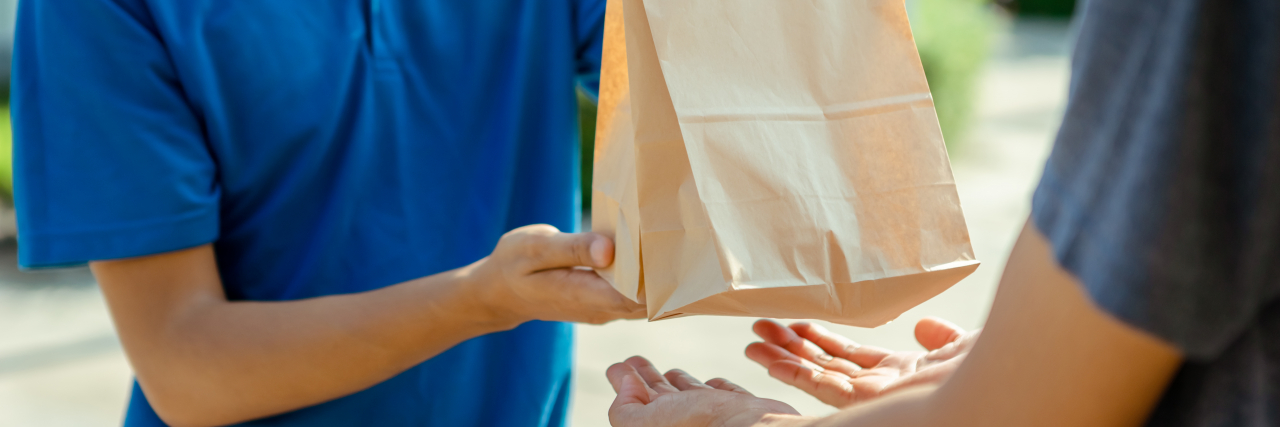To the Delivery Driver Who Told Me He ‘Wasn’t That Worried’ About My COVID-19
I’ve finally begun to see the light at the end of a week of hell that has been COVID-19. I finally have a little more energy, able to work at a reasonable pace without feeling exhausted, but I’m still testing positive and the lingering effects of the Omicron variant make me feel like my airways are filled with expanding insulation foam. Meanwhile, my partner’s cough moves ever-deeper into suspected bronchitis (at best) and she sleeps away her days in fatigue.
We needed groceries. We left a warning (as we are expected to do), but the first sign of your negligence came when you strolled up to my door, maskless like so many, disregarding the social distancing that’s meant to protect us both. I was courteous, asking if you’d seen the note. You hadn’t — no big deal, I thought, fighting the disbelief that you wouldn’t still be checking for such a thing. So, I told you we were positive for COVID-19 and asked you to take a few steps back for your own protection.
“Yeah,” you said. “OK. I’ll step back here. I’m not that worried about it, though.”
It was a slap. I’ve grown increasingly impatient with the growing population failing to take proper precautions, but coming off the back of this week of fear… I’d had enough. I told you a little about what I’ve been through. You seemed nonchalant. I wish I could’ve said more, but anxiety held my tongue for fear of the retribution that could’ve followed. After all, I don’t know you; I don’t know what you could be capable of doing to me and mine. So, instead, I’ll tell you here.
Have you ever watched the one you love struggle to breathe, barely able to stay conscious, talking about pins and needles rising through her limbs and a shooting pain in her left arm? Have you ever watched such a thing when you’re already haunted by the ghosts of loved ones lost, fearing the next person could be your partner? Have you been told by paramedics to fetch a defibrillator if one is available? Because I have, and I felt so sure, at one point this past week, that I was about to lose the person dearest to me. It all worked out OK, but we were lucky; 6.32 million people weren’t lucky, at the time of writing this article. And sure, you’re probably fit; you’re maybe even vaccinated, but you just don’t know how this virus is going to affect you and yours.
This week was harrowing, and that comes from me — the person who has been terrified of catching this virus for over two years, who has been practicing every safeguard and yet still caught it anyway due to the growing complacency of a vast number. I’ve coughed so much I thought my throat would tear. I’ve cried, feeling too weak to cook, eat, stay awake, and take care of my partner. And the funny thing is, I’ve had it reasonably easy. My partner has slept most of every day. Her fatigue has barely lessened. And, while I’m able to work now, she’s still unable to. We’re both afraid of the possibility of long-COVID. What happens then?
Are you just not that worried about losing income? Losing loved ones? Losing yourself?
As infections spike again in the United Kingdom, and breaking studies suggest that two new Omicron variants are unaffected by antibodies from vaccination and prior infection, I have to wonder what it would take for someone like you to care. For what it’s worth, though, I hope you don’t get it from me. This week wasn’t fun, and instead of making me less afraid of COVID-19 as I hoped it might, it’s actually done the opposite. My fears are fresh and ripe, as they should be for you.
COVID-19 is still here, and we haven’t seen the last of it. If someone like me — who is reasonably healthy, vaccinated, wearing a mask, and routinely sanitizing his hands — can catch COVID-19 despite every precaution, what does it mean for the more vulnerable among us? What does it mean for someone like you, who “isn’t that worried” about it?
Getty image by champpix.

